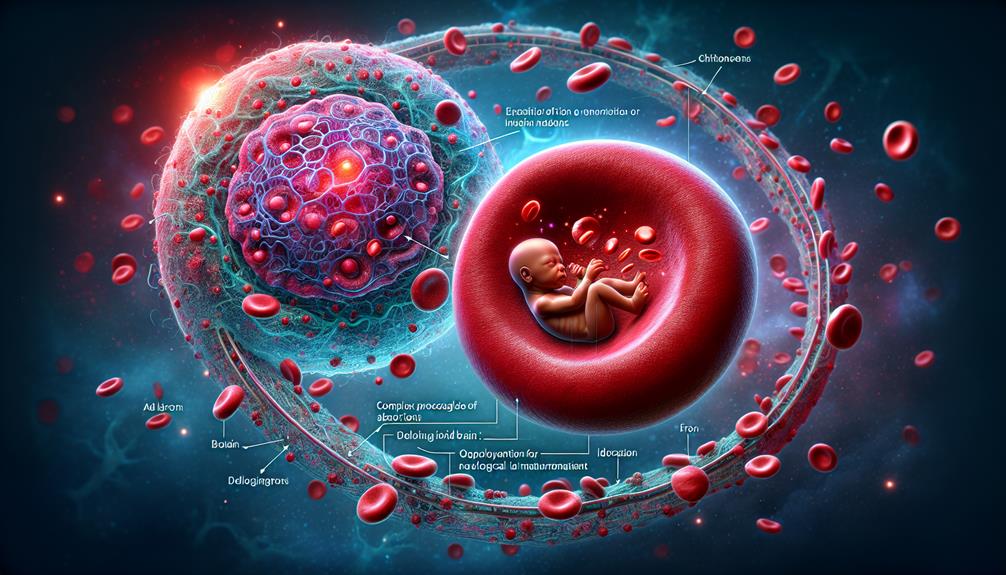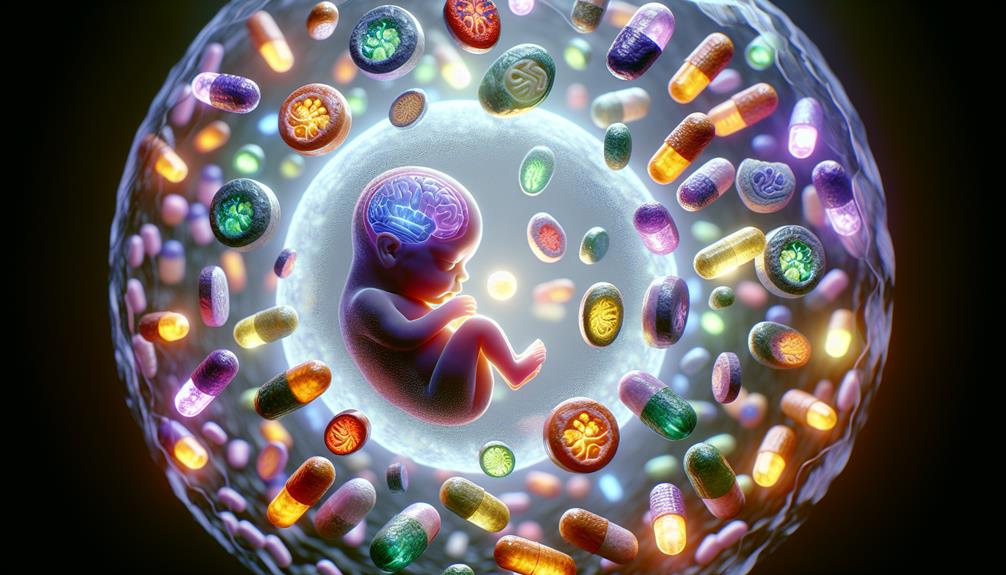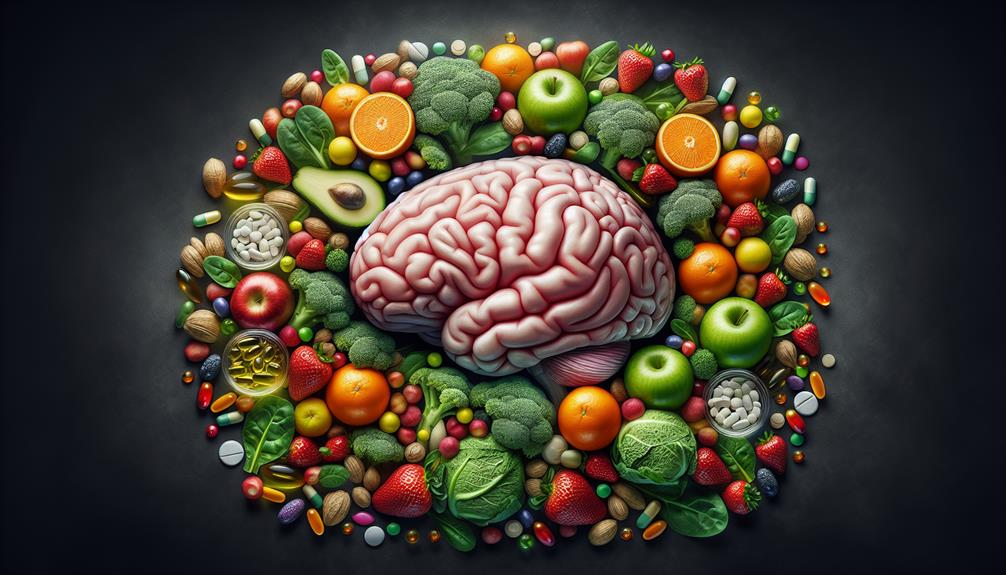







Prenatal vitamins help brain development by supplying essential nutrients like folic acid, iron, and omega-3 fatty acids. Folic acid supports neural tube formation and prevents defects. Iron is necessary for brain growth and cognitive function. Omega-3 fatty acids aid brain development and cognitive function. Important neural pathways form early in pregnancy. Nutrients like folic acid, iron, and iodine are critical. Maternal health affects nutrient absorption, impacting brain development. Follow doctor's advice closely for best results. Check ingredients and dosage when selecting prenatal vitamins. Ensure expert guidance to support healthy brain development in fetuses.
Key Takeaways
- Folic acid aids in neural tube formation and prevents neural tube defects.
- Iron supports brain development, oxygen transport, and cognitive function.
- Omega-3 fatty acids promote brain and eye development, memory retention, and cognitive function.
- Key nutrients like folic acid, iron, and iodine are vital for neural pathway formation.
- Proper prenatal vitamin dosage tailored to individual needs enhances cognitive development.
Importance of Prenatal Vitamins
Prenatal vitamins are essential for supporting the healthy development of your baby's brain during pregnancy. Nutritional support plays a critical role in ensuring the best brain health for your growing fetus. These vitamins contain a variety of key nutrients, such as folic acid, iron, and omega-3 fatty acids, which are crucial for brain development.
Folic acid, a B vitamin, is particularly important in the early stages of pregnancy as it aids in neural tube formation, which eventually develops into the baby's brain and spinal cord. Iron is essential for carrying oxygen to the baby's brain cells, supporting their growth and development. Omega-3 fatty acids, especially DHA (docosahexaenoic acid), play a significant role in the structural development of the brain and eyes.
Ensuring you have an adequate intake of these nutrients through prenatal vitamins can have a significant impact on your baby's brain development, setting the foundation for their cognitive and neurological functions later in life. Remember, a well-nourished body supports the healthy growth of your baby's brain.
Role of Folic Acid
Playing an important role in early pregnancy, folic acid supports neural tube formation, a vital step in developing the baby's brain and spinal cord. Adequate folic acid intake is essential as it helps prevent neural tube defects like spina bifida and anencephaly. Folic acid is a B vitamin that plays a significant role in DNA synthesis and repair, cell division, and growth. By aiding in the production of red blood cells, folic acid guarantees proper oxygen supply to the developing fetal brain, supporting its growth and function.
Research has shown the benefits of folic acid in promoting overall brain health. It is particularly essential during the early stages of pregnancy when the neural tube is forming. This nutrient supports the closure of the neural tube, which later develops into the baby's brain and spinal cord. Ensuring adequate folic acid levels through prenatal vitamins or a balanced diet can positively impact the baby's brain development and reduce the risk of certain birth defects related to the brain and spinal cord.
Impact of Iron

Iron is an essential mineral during pregnancy, contributing significantly to the development of the baby's brain and overall health. Adequate iron levels are vital for the formation of hemoglobin, the protein in red blood cells responsible for carrying oxygen to tissues, including the developing brain. Iron plays a fundamental role in brain health by supporting cognitive function, neurotransmitter synthesis, and myelination, the process of insulating nerve fibers to enhance signal transmission.
During pregnancy, the body increases iron absorption to meet the demands of the growing fetus. Iron absorption is influenced by various factors, including dietary sources, iron stores in the body, and the presence of other nutrients. Ensuring sufficient iron intake through diet and supplementation is essential to prevent iron deficiency anemia, which can have detrimental effects on both maternal and fetal health, impacting brain development.
Benefits of Omega-3 Fatty Acids
Omega-3 fatty acids play an important role in supporting brain development during pregnancy, providing essential nutrients that contribute to cognitive function and neuronal growth. Docosahexaenoic acid (DHA), a type of omega-3 fatty acid, offers various benefits such as aiding in memory retention. DHA is a pivotal component of the brain, particularly in the hippocampus, a region critical for memory formation. By consuming DHA-rich foods or supplements, you can help make sure that your baby's brain receives the necessary building blocks for excellent cognitive development.
Eicosapentaenoic acid (EPA), another omega-3 fatty acid, also plays a significant role in promoting brain health. While DHA is more concentrated in the brain, EPA supports overall brain function by reducing inflammation and supporting healthy blood flow to the brain. Including EPA in your diet can help create a favorable environment for your baby's brain development.
Incorporating omega-3 fatty acids, specifically DHA and EPA, into your prenatal nutrition plan can be beneficial for both you and your baby, supporting cognitive function and overall brain health during this critical period of development.
Neurological Development in Fetuses

Supporting brain development in your baby starts with understanding the intricate process of neurological development in fetuses. During pregnancy, your baby's brain undergoes rapid growth and maturation. Neural pathways, which are essential for transmitting signals within the brain, begin to form as early as the first trimester. These pathways serve as the foundation for various cognitive functions and behaviors later in life.
Brain growth in fetuses is a complex process that requires adequate nutrition and support. Key nutrients such as folic acid, iron, and iodine play vital roles in ensuring proper brain development. Folic acid, for instance, is essential for neural tube formation, a critical step in early brain development. Iron supports oxygen delivery to the brain, while iodine is necessary for thyroid hormone production, which regulates brain growth.
Cognitive Function Support
Ensuring sufficient intake of essential nutrients during pregnancy is essential for promoting ideal cognitive function in developing fetuses. Prenatal vitamins play an important role in supporting cognitive development and brain health. The nutrients in these supplements, such as folic acid, iron, and omega-3 fatty acids, contribute to memory enhancement and improved learning abilities in the growing fetus.
Folic acid, a B vitamin, is recognized for its role in neural tube formation and has been linked to cognitive development. Iron is necessary for oxygen transport, which is critical for brain health and function. Omega-3 fatty acids, particularly DHA, are essential building blocks for brain cells, aiding in cognitive function and memory.
Research suggests that maternal intake of these nutrients through prenatal vitamins positively impacts the cognitive abilities of offspring. By supporting brain development during pregnancy, prenatal vitamins contribute to long-term cognitive health in children. Hence, ensuring that you consume an adequate amount of essential nutrients through prenatal vitamins is a proactive step towards enhancing cognitive function in your developing fetus.
Nutrient Deficiencies and Risks

Adequate intake of essential nutrients during pregnancy is important to prevent nutrient deficiencies and associated risks that can impact the cognitive development of the fetus. Maternal health plays a significant role in ensuring the proper absorption of these crucial nutrients. When a pregnant person lacks essential vitamins and minerals, it can lead to deficiencies that may negatively affect the development of the fetal brain. For instance, inadequate levels of nutrients like folic acid, iron, iodine, and omega-3 fatty acids have been linked to an increased risk of cognitive impairments in babies. These deficiencies can also result in adverse outcomes for the mother, such as anemia or thyroid disorders, further underscoring the importance of maintaining optimal nutrient levels during pregnancy. Ensuring that the mother's body can effectively absorb and utilize these vital nutrients is essential for supporting the healthy brain development of the fetus. By prioritizing maternal health and adequate nutrient absorption, the risks associated with nutrient deficiencies can be minimized, promoting the best cognitive outcomes for the developing baby.
Doctors Recommendations and Dosage
To guarantee optimal brain development for your baby, adhere to your doctor's recommendations on prenatal vitamin dosage closely. Your doctor will provide you with specific dosage guidelines tailored to your individual needs. It's essential to follow this expert advice to make certain you are providing the necessary nutrients for your baby's brain development. Prenatal vitamins typically contain key ingredients like folic acid, iron, and omega-3 fatty acids, all of which play a vital role in supporting brain development in fetuses.
Experts recommend taking prenatal vitamins throughout pregnancy, starting ideally before conception. The dosage guidelines may vary based on factors such as your overall health, dietary habits, and any existing nutrient deficiencies. Your doctor may suggest a higher dosage if you have specific needs or conditions that require additional supplementation. It's important not to exceed the recommended dosage unless advised by your healthcare provider, as excessive intake of certain vitamins and minerals can have adverse effects on both you and your baby. Always consult your doctor for personalized recommendations and dosages tailored to your individual requirements.
Choosing the Right Prenatal Vitamin

For optimal brain development during pregnancy, selecting the appropriate prenatal vitamin is essential to guaranteeing your baby receives vital nutrients. When choosing a prenatal vitamin, take into account factors such as ingredient sourcing, dosage accuracy, brand reputation, and price comparison.
Firstly, examine the ingredient list to make sure the prenatal vitamin contains key nutrients like folic acid, iron, calcium, and omega-3 fatty acids. Choose vitamins with ingredients from reputable sources to ensure quality and purity.
Dosage accuracy is vital. Verify that the prenatal vitamin offers the recommended daily intake of essential nutrients for pregnant women. Consult with your healthcare provider to determine the suitable dosage for your specific needs.
Research the brand's reputation and select a prenatal vitamin from a reliable and well-established company known for producing high-quality supplements. Additionally, compare prices to discover a prenatal vitamin that fits your budget without compromising on quality. By carefully considering ingredient quality, dosage accuracy, brand reputation, and price, you can choose the right prenatal vitamin to support your baby's brain development during pregnancy.






